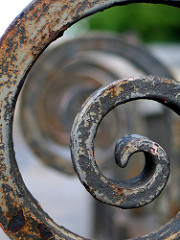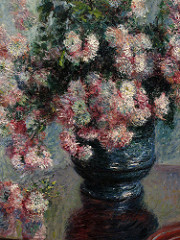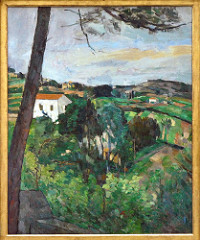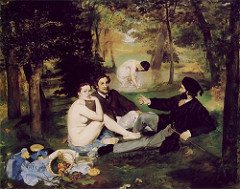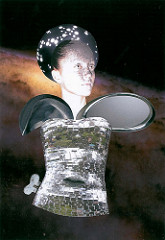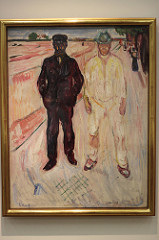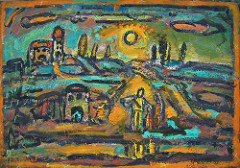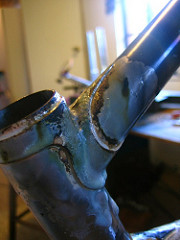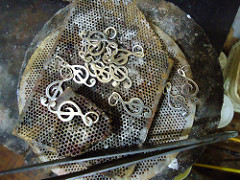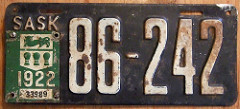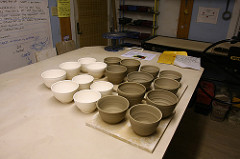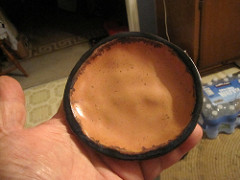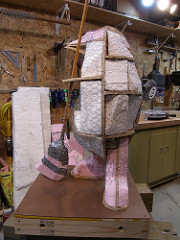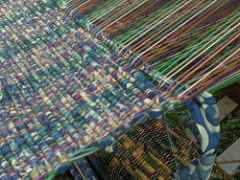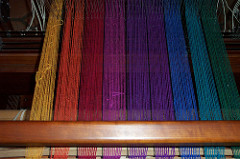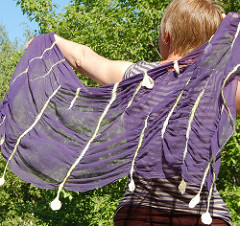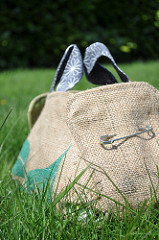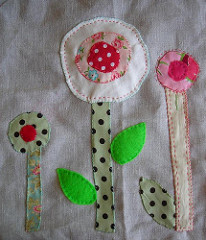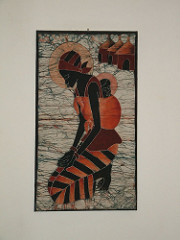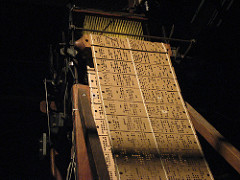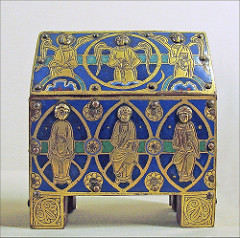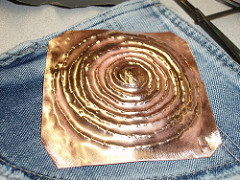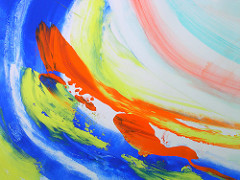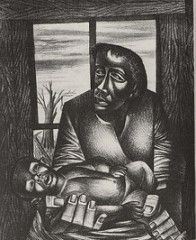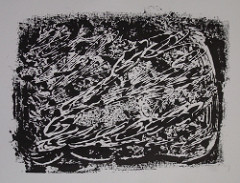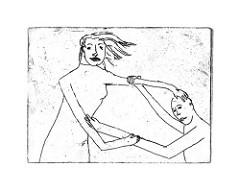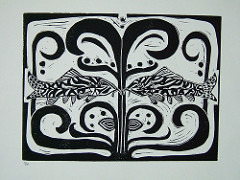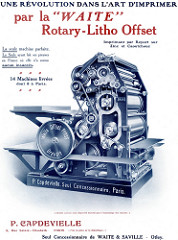Intensity
term used to describe the many degrees of shading between black and white
Value
the amount of light reflected by a hue
Hue
the dimension of color that is determined by the wavelength of light; what we know as the color names blue, green, and so forth.
Cloisonne
An enameling technique in which thin wire partitions-cloisons-are filled with enamel. It is an art form practiced in ancient Byzantium
Chiaroscuro
Italian "light-dark". The gradation of light and dark values in two-dimensional imagery; especially the illusion of rounded, three-dimensional form created through gradations of light and shade rather than line.
volute
a structure consisting of something wound in a continuous series of loops
tempera
method of painting in which the colors are mixed with egg yolk or other substances, instead of oil
Monet
French Painter, who started his career as a caricaturist, then converted to landscape painting by his early mentor Boudin. From 1890 he concentrated on series of pictures in which he painted the same subject at different times of the day in different lights. During the Franco-Prussian War (1870-71) he took refuge in England with Pissarro: he studied the work of Constable and Turner. By 1890 he was successful enough to buy the house he had previously rented. In his final years, he was troubled by failing eyesight. However, he continued to paint until the end of his life. He was enormously prolific and many major galleries have examples of his work.
cezanne
Date: 1839-1906
Important: Painted Mount Saint Victoire in Aix en- Provence over 60 times. Each painting is different b/c of angle and light.
-Trust your own eyes, and fanatic for the truth.
-Light- vibrations of color
-Like an impressionist- heavy handed work, studio work was interior, and love of nature.
-Plenair- painting outside, French postimpressionist painter who influenced modern art (especially cubism) by stressing the structural components latent in nature (1839-1906), -French postimpressionist painter who influenced modern art (especially cubism) by stressing the structural components latent in nature (1839-1906)
picasso
Spanish founder of cubism; made Les Demoiselles d'Avignon to seek to create a new visual reality and provoke revolutionary upheaval; his figures are broken into large, flat planes with dislocated body parts; used African masks; very non-Western; Guernica; cubism; Three Musicians
casein paint
a water-base paint made with casein (which is a protein precipitated from milk)
impressionism
An artistic movement that sought to capture a momentary feel, or impression, of the piece they were drawing
An artistic movement that sought to capture a momentary feel, or impression, of the piece they were drawing
futurism
an Italian movement begun shortly before and during WWI. It depicted dynamic movement and stressed the violence and speed of the Machine Age. They advocated revolution and glorified war.(Balla, Severini, Boccioni)
expressionism
paintings with the emphasis on inner emotions, sensations, or ideas rather than actual appearances
extentialism
a philosophical doctrine and literary and dramatic movement that insists on the existence of individuals as basic and important. believes that the world is inhernetly meaningless and individuals must find meaning in their literal, concrete existence and not in any abstract dogmas or ideas.
The belief that humans create their own meaning. Humans take responsibility for their own actions, free will is all we have. The belief that we can figure out who we want to be and what our place is in the world. "who am I "
expressionist
which emphasized the artist's free expression of emotion, flourished in Germany in the year immediately prior to the outbreak of World War I. Georges Rouault (1871-1958), a French painter, is regarded as this type of painter. Portrayal of reality expressing the anguished feelings many had at the time. Used geometric forms and striking colors. Munch, Munter, Kandinsky. Leads to abstract painting.
art movement in early 20th century europe that focused on capturing the subjective feeling toward objective reality
op art
a style of abstractionism popular in the 1960s, modern technique with which a painter creates optical illusions with the use of dazzling patterns.
abstract art athat uses geometric shapes and vivid colors to create optical illusions, such as an illusion of movement
brazing
joining of two metals above 800F (most common)
the process of joining metal with a filler rod that melts at a temperature below the metal being joined
the process of joining metal with a filler rod that melts at a temperature below the metal being joined
Uses a molten filler metal to crate joints. Capillary action is required to distribute the filler metal.
soldering
Joining small pieces of metal together using molten metal.
bonding metals and alloys that melt at temperatures below 840° F
welding
fastening two pieces of metal together by softening with heat and applying pressure
Fusing two pieces of material using a heat process; most commonly used with metal and plastics
embossing
to raise a relief design on the surface of paper through pressure-raised paper to form image, with or without ink printed
tusche
in lithography, a waxy substance used to draw or paint images on a lithographic stone or plate
bisque
Pottery that has been fired but not yet glazed.
vanadium oxide
pale green
iron oxide
produces a red dye
the chemical name for rust
cobalt oxide
creates blue dye
armature
n. something that supports a sculpture
weft
the threads running from side to side across a fabric; wool
warp
yarn arranged lengthways on a loom and crossed by the woof
shag
..., a matted tangle of hair or fiber
chiffon
A plain woven lightweight, extremely sheer, airy, and soft silk fabric, containing highly twisted filament yarns. The fabric, used mainly in evening dresses and scarves, can also be made from rayon and other manufactured fibers
buckram
a coarse cotton fabric stiffened with glue
stiff-finished cotton or linen used for linings of garments
burlap
a coarse, inexpensive, woven fabric; often used for making grain sacks
applique
a decorative design made of one material sewn over another
batik
A fabric-dyeing method which uses wax to coat areas that don't need to be dyed
jacquard
a loom with an attachment for forming openings for the passage of the shuttle between the warp threads
French inventor of the Jacquard loom that could automatically weave complicated patterns (1752-1834)
petit point
Embroidery done in cross-stitch on fine single net
materials used in early american crafts
wrought iron, hammered copper, painted tin NOT pewter
How copper and brass are darkened
application of potassium sulphide
champleve
..., Enameling technique, used more gold and less color than cloisonne. Starts with thick gold piece, cut tiny troughs wherever want color to be, gold is most prominent in end, rarely has patterns engraved.
repousse
..., formed in relief by beating a metal plate from the back, leaving the impression on the face
gouache
watercolor with inert white pigment mixed in. Inert pigment is pigment that becomes colorless or virtually colorless paint. In gouache, it serves to make the color opaque, which means it is used at full length.
watercolor mixed with a high concentration of pigment and an opaque ingredient such as chalk
granulation
technique of ornamenting in which small grains of metal, usually gold, are soldered to a flat surface
hatching
shading consisting of multiple crossing lines
iconostasis
A solid screen, covered with icons, at the front of the church, dividing the sanctuary from the body of the building.
streaming video
term used to visualize a recreation of audio-video
nic card
..., Network Interface Card; the device that enables a workstation to connect to the network and communicate with other computers.
lithograph
made possible by the contrariety between grease and water, printing produced through the use of ink on a flat surface (e.g., stone or metal,
A print produced by a printing process in which a smooth surface is treated so that the ink will adhere only to the design to be printed
dry point
..., printmaking where the design is scratched into the steel plate with a hard, steel tool
serigraph
..., a print made using a stencil process in which an image or design is superimposed on a very fine mesh screen and printing ink is squeegeed onto the printing surface through the area of the screen that is not covered by the stencil
monotype
..., a simple printmaking technique in which ink or paint is appleid to a metal or plastic plate, worked with various tools, and then printed onto paper using a press, roller, or other pressure.
Mezzotint, aquatint, stipple
processes designed to produce tonal effects
aquatint
This technique is so called because its finished prints often resemble watercolors or wash drawings. It is a favorite method of printmakers to achieve a wide range of tonal values. The technique consists of exposing the plate to acid through a layer (or sometimes succesive layers) of resin or sugar. The acid bites the plate only in the spaces between the resin particles, achieving a finely and evenly pitted surface that yields broad areas of tone when the grains are washed off and the plate is inked and printed. A great many tones can be achieved on a single plate by exposing different areas to different acid concentrations or different exposure times. Aquatint techniques are generally used in combination with etching or engraving to achieve linear definition. Aquatint was little favored by etchers until Francisco Goya used it to such great effect in his celebrated edition of 80 etchings entitled "Los Caprichos." After Goya the technique was used extensively by Edgar Degas and Camille Pissarro.
stipple
technique of shading using dots to control value
Intaglio
incised engraving, the process of printing from engraved plates, a printing process that uses an etched or engraved plate, ex: the plate is smeared with ink and Then wiped clean. The ink left in the recesses is what makes the print.
Relief print
printing process in which the printing plate that has raised that is rolled with ink to print.
Offset
a plate makes an inked impression on a rubber-blanketed cylinder, which in turn transfers it to the paper
Planishing
process of smoothing metal surface witha flat or slightly round-faced hammer
Leger
French painter who was an early cubist (1881-1955)
Influences include hard sharp precision of a machine age
Portico
a porch or entrance to a building consisting of a covered and often columned area
Roman buildings followed this Greek architectural style
Rembrandt
Renowned for paintings and prints
Steuben
Known for his glass sculpture
Japanese temples
Emphasis of this architecture is on the horizontal
Germany
Where the revolving door was fully developed
Gothic
Period in which stained glass windows were introduced for church decoration
John zenger
Journalist who questioned the policies of the governor of New York in the 1700's. He was jailed; he sued, and this court case was the basis for our freedom of speech and press. He was found not guilty.
Pitch
Material used to imbed rings, bracelets, necklaces,etc when making hand-wrought jewelry
